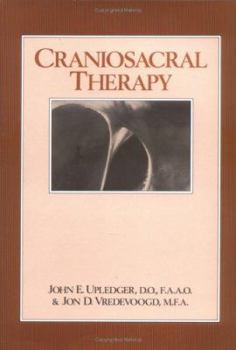Craniosacral Therapy
Select Format
Select Condition 
Book Overview
Craniosacral Therapy is a practical, comprehensive textbook that defines the physiology and anatomy of the craniosacral system, its function in health, and relationship to disease processes. It... This description may be from another edition of this product.
Format:Hardcover
Language:English
ISBN:0939616017
ISBN13:9780939616015
Release Date:January 1983
Publisher:Eastland Press
Length:367 Pages
Weight:2.27 lbs.
Dimensions:1.2" x 7.2" x 10.2"
Customer Reviews
4 ratings
Great resource!
Published by Thriftbooks.com User , 15 years ago
This is a great resource for anyone wanting to practice CranioSacral Therapy. The first few chapters of the book are exactly what is taught in the Upledger Institute's CranioSacral Therapy I.
Well done!
Published by Thriftbooks.com User , 17 years ago
I've long had this book on my bookshelf. It was the first book of the kind ever written with easy to understand hand-drawn illustrations. I encountered this book when I was first exploring the healing art of CranioSacral Therapy. The anatomy is excellent--there are absolutely no mistakes in the anatomy here and I challenge anyone to comment on this review to contrary. The territory this book covers is mind blowing. Warning: Approach with an open mind AND in the spirit of scientific inquiry. This is not a book for the Casual Reader. This is a book for the serious student of both Cranial Osteopathy and CranioSacral Therapy. (Speaking of which, has the student ever tried to crack open one of Dr. William Garner Sutherland's early tomes?) I'm grateful this book existed when I had questions that nobody else could answer. Bravo, Dr. John Upledger! Well done! James Nemec LMT, CST-D Author of, TOUCH THE OCEAN: THE POWER OF OUR COLLECTIVE EMOTIONS
Controversial but not quite a quack science
Published by Thriftbooks.com User , 20 years ago
Au contraire Mr. Deveno, everyone knows the cranial rhythmic impulse, like the pulse rate and blood pressure, varies from time to time and from person to person and from measurer to measurer. But this is an aside. A recent article in the respected Journal of Pediatrics, showed that osteopathic manipulation (which included CST) helped in cases of otitis media (i.e. ear infections). What makes CST controversial is the theory that the cranial sutures are being moved and that cerebrospinal fluid motion is being influenced. This is the theory behind CST. For all we know the working mechanism of CST could be completely different. Upledger's book is well written and gives practical advice on the treatment of patients, as well as the current working theory behind CST. He includes not only his variation of the vault maneuvers, but also the classical vault maneuvers developed by Sutherland.By the way it should be noted that Upledger taught CST at MSU-College of Osteopathic Medicine which is consistently ranked as a top 50 medical school by US News and World Report.
A foundation for anyone doing Craniosacral therapy
Published by Thriftbooks.com User , 21 years ago
As a student at a massage school which highly values craniosacral therapy I have been learning this therapy in class and recently attended the first course from Upledger Institute (CS1) For anyone interested in taking CS courses from the institute this is required reading for the class (first 6 chapters). After attending the class and using these techniques in clinic I am thrilled by this hands on, educational and technique perfecting book.This is not meant for people just wondering what Craniosacral therapy is (try 'Inner Physician and You' or "Touchstone for Health" if you want an easy, interesting intro of case studies and experiences) but more for a therapist (liscensed or not, anyone who is actually interested in PERFORMING the work) to use as a text book. It is absolutely written as such, but for someone like me who had learned it at school, and sometimes struggled with the theory and study and knowledge behind it. it is an amzing read. You will learn hand positions, suture release techniques, 10 step protocol, direction of energy, and so much more. If you think this may be a therapy you are adding to your practice then I recommend this book highly. It is presented with the assumption of the reader fluent in anatomical terms and familiar with CS history.





